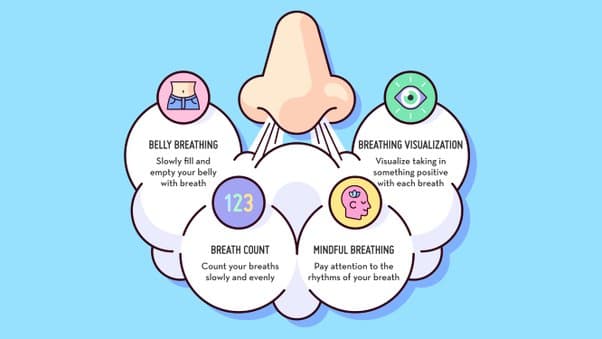Breathing Slowly Can Be Life Saving



Breathing Slowly Is Healthy and Calming
Breathing is something we do every day, but we often don't pay much attention to it. However, breathing is not just a simple act of inhaling and exhaling air. It is also a powerful tool that can affect our physical and mental health, as well as our mood and emotions.
One of the benefits of breathing slowly is that it can help us relax and calm down. When we are stressed, anxious, or angry, our breathing tends to become shallow, rapid, and irregular. This can trigger the sympathetic nervous system, which is responsible for the fight-or-flight response. This response prepares us for action, but it also increases our heart rate, blood pressure, and muscle tension.
On the other hand, when we breathe slowly, deeply, and rhythmically, we activate the parasympathetic nervous system, which is responsible for the rest-and-digest response. This response calms us down and restores our balance. It also lowers our heart rate, blood pressure, and muscle tension. It also activates the vagus nerve, which is responsible for regulating our heart rate, digestion, and other bodily functions. Here are 5 ways to stimuate the vagus nerve. (1)
Another benefit of breathing slowly is that it can improve our oxygen delivery and blood circulation. When we breathe fast and shallow, we don't use the full capacity of our lungs. We only fill the upper part of our lungs with air, which means that less oxygen reaches our bloodstream and our cells. This can make us feel tired, dizzy, or confused.
However, when we breathe slow and deep, we use the whole volume of our lungs. We fill the lower part of our lungs with air, which has more blood vessels and more capacity to exchange oxygen and carbon dioxide. This means that more oxygen gets into our blood and reaches our organs and tissues. This can make us feel more energetic, alert, and focused.
Breathing slowly can also help us regulate our emotions and cope with negative feelings. When we are upset or overwhelmed by something, we tend to react impulsively or emotionally. We may say or do things that we regret later or that hurt ourselves or others.
But if we take a moment to breathe slowly before we respond, we can create some space between the stimulus and our reaction. We can calm ourselves down and think more clearly. We can also become more aware of what we are feeling and why. This can help us choose a more appropriate and constructive way to deal with the situation.
Breathing slowly is a simple but effective way to improve our health and well-being. It can help us relax, reduce stress, increase oxygenation, enhance circulation, balance emotions, and cope with challenges. It doesn't cost anything and it doesn't take much time. All we need is to pay attention to our breath and slow it down.
Here are some tips on how to practice slow breathing:
-
Find a comfortable position and place one hand on your chest and the other on your abdomen.
-
Breathe in through your nose and feel your abdomen expand with air. Your chest should move slightly or not at all.
-
Breathe out through your mouth and feel your abdomen contract. Your chest should move slightly or not at all.
-
Try to make your exhale longer than your inhale. You can count to four as you inhale and count to six as you exhale.
-
Repeat this cycle for a few minutes or until you feel calm and relaxed.
-
You can practice slow breathing anytime and anywhere you need it.
Breathing slowly is a technique that can help us relax, calm our minds and reduce stress. But where did this practice come from and how did it evolve over time? In this blog post, we will explore the origins and benefits of slow breathing, as well as some tips on how to do it effectively.
The history of slow breathing can be traced back to ancient civilizations, such as India, China and Egypt, where it was part of various spiritual and religious traditions. For example, in Hinduism, slow breathing is known as pranayama, which means "control of life force". Pranayama is one of the eight limbs of yoga, and it involves different types of breathing exercises that aim to balance the energy flow in the body and mind. Similarly, in Taoism, slow breathing is called qigong, which means "cultivation of energy". Qigong is a practice that combines breathing, movement and meditation to enhance health and well-being. In ancient Egypt, slow breathing was associated with the god Thoth, who was the patron of wisdom, writing and magic. Thoth was said to have taught humans how to breathe slowly and rhythmically to access higher states of consciousness.
The benefits of slow breathing are not only spiritual, but also physical and mental. Scientific studies have shown that slow breathing can lower blood pressure, heart rate and cortisol levels, which are linked to stress and inflammation. Slow breathing can also improve oxygen delivery to the brain and other organs, which can boost cognitive function and memory. Moreover, slow breathing can activate the parasympathetic nervous system, which is responsible for the "rest and digest" response. This can help us relax, sleep better and digest food more efficiently. Additionally, slow breathing can increase the production of endorphins, which are natural painkillers and mood enhancers.
Slow breathing is a simple but powerful practice that can benefit us in many ways. It can help us connect with our inner self, calm our emotions and improve our health. By learning from the ancient wisdom of slow breathing, we can enhance our quality of life in the modern world.
Click Here to read more on our Documentation of Breath Awareness